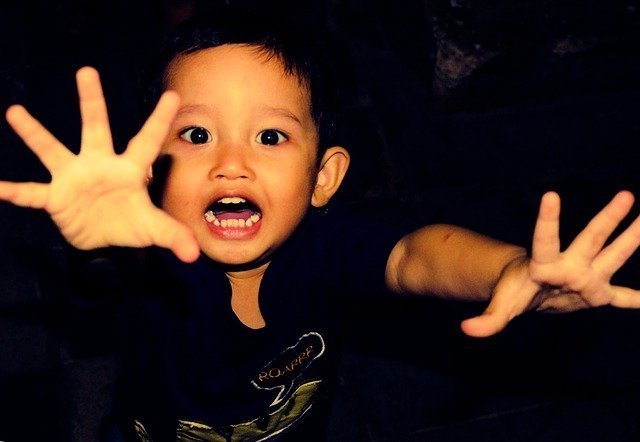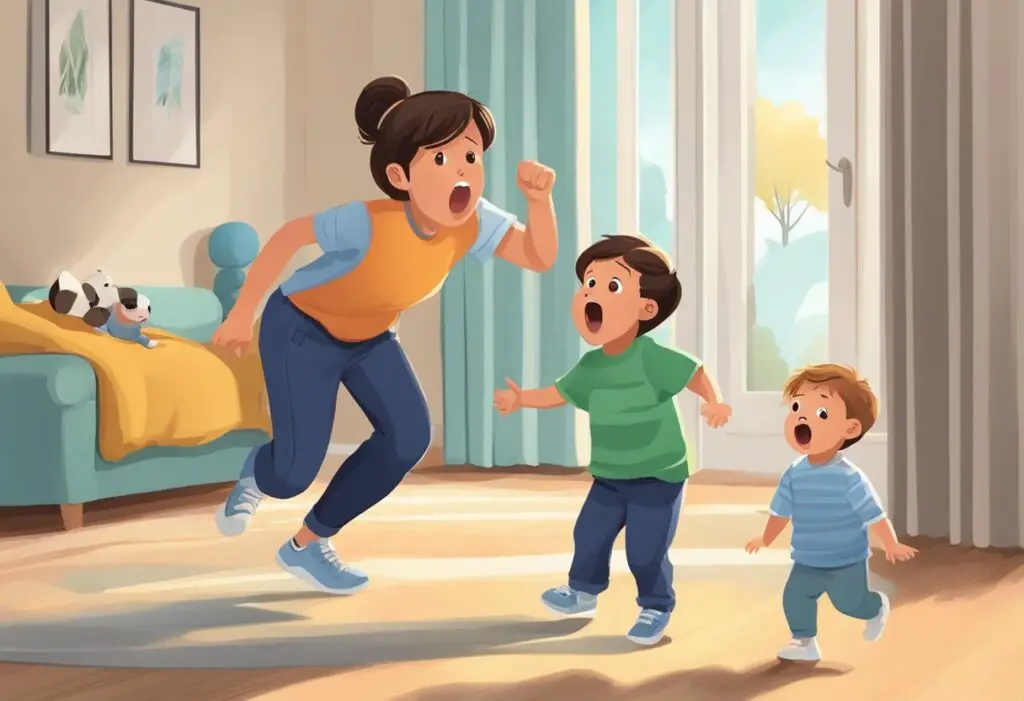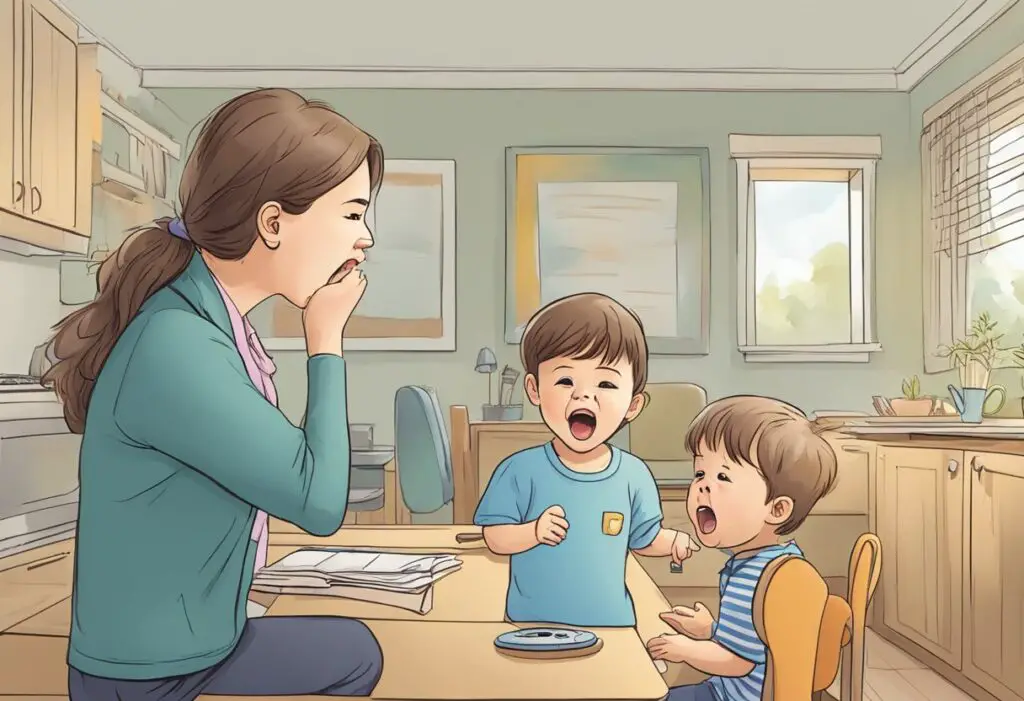You thought the terrible twos were bad, but now your three-year-old is yelling at you, and it feels like you’re living with a tiny dictator. You’re not alone. Many parents of three-year-olds experience this challenging behavior.
It’s important to remember that your child is not trying to be difficult on purpose. They are still learning how to communicate their feelings and emotions effectively.

Reasons why your Toddler is immune to your squawking!
When your three-year-old starts yelling, it can be frustrating and overwhelming. It’s important to stay calm and model appropriate behavior. Yelling back or reacting with anger will only escalate the situation. Instead, try to validate your child’s feelings and help them find a more appropriate way to express themselves. This can be as simple as saying, “I understand that you’re feeling angry, but yelling is not okay. Let’s take a deep breath and use our words to talk about how we’re feeling.”
It’s also important to consider the root cause of your child’s yelling. Are they feeling overwhelmed or overstimulated? Are they hungry or tired? Addressing these underlying issues can help prevent future outbursts. With patience and consistency, you can help your three-year-old learn to communicate their feelings in a more effective and respectful way.
The Art of Decoding the Yelling
Congratulations! You have reached a new milestone in your parenting journey. Your three-year-old has learned how to express their emotions through yelling. While this may not be the most pleasant experience, it is a sign that your child is developing and learning how to communicate their feelings.
However, decoding your child’s yelling can be a challenging task. Here are some tips to help you navigate this new phase of your parenting journey:
1. Listen and Observe
When your child starts yelling, take a step back and observe their behavior. Are they upset about something specific? Are they tired or hungry? By listening and observing, you can gain insight into what may be causing their outburst.
2. Stay Calm
It can be tempting to yell back at your child, but this will only escalate the situation. Take a deep breath and remain calm. By staying calm, you can model appropriate behavior and show your child that yelling is not the best way to communicate.
-

Bold Male Pride – Baseball Trucker Cap Celebrating Masculinity
$25.00 Select options This product has multiple variants. The options may be chosen on the product page -

Dad Bod Appreciation Gift Mug
$20.00 Add to cart -

Dad Bod, Bad Jokes Structured Baseball Cap
$30.00 Select options This product has multiple variants. The options may be chosen on the product page
3. Validate Their Emotions
Even if you don’t understand why your child is yelling, it is important to validate their emotions. Let them know that you hear them and that their feelings are important. This can help your child feel heard and understood.
4. Set Boundaries
While it is important to validate your child’s emotions, it is also important to set boundaries. Let your child know that yelling is not an acceptable way to communicate and that there are other ways to express their feelings.
5. Seek Help if Needed
If your child’s yelling is becoming a regular occurrence and is causing issues in your parent-child relationship, it may be time to seek help. Verbal abuse can have long-term psychological effects on children, so it is important to address the issue before it becomes out of control.
Remember, yelling is a natural part of your child’s development, but it is important to teach them how to communicate effectively. By listening, staying calm, validating their emotions, setting boundaries, and seeking help if needed, you can navigate this new phase of your parenting journey with ease.
Turning Down the Volume: Effective Strategies
So, your 3-year-old is yelling at you, and you’re at your wit’s end. It can be frustrating, but remember that yelling back won’t solve the problem. Instead, try some of these effective strategies to turn down the volume and promote healthy communication with your child.
Calm Down First
It’s hard to communicate effectively when you’re angry or upset. Take a deep breath and calm down before responding to your child’s yelling. This will help you stay in control and model self-control for your child.
Use Positive Discipline
Discipline doesn’t have to be punishment. Positive discipline focuses on teaching your child the right behavior instead of just punishing them for the wrong behavior. For example, instead of yelling at your child for hitting their sibling, teach them how to use their words to express their frustration.
Communicate Clearly
Your child may not understand why their yelling is a problem. Communicate clearly and calmly why their behavior is not acceptable. Use simple language and make sure they understand what you’re saying.
Set Consequences
Consequences can be an effective way to discourage yelling. For example, if your child continues to yell after you’ve asked them to stop, set a consequence like a time-out. Make sure the consequence is appropriate for their age and behavior.
Use Time-Outs
Time-outs can be a useful tool to help your child calm down and reflect on their behavior. When your child is yelling, calmly tell them that they need a time-out and take them to a designated area. Make sure the time-out is age-appropriate and that your child understands why they’re in time-out.
Model Healthy Communication
Children learn by example. Model healthy communication by speaking calmly and respectfully to your child. If you find yourself yelling, take a step back and apologize for your behavior.
Remember, yelling at your child won’t solve the problem. Use these effective strategies to turn down the volume and promote healthy communication with your 3-year-old.
When Tantrums Take the Stage
Congratulations, you have a three-year-old! You’re probably already a pro at handling tantrums, but sometimes your little one’s yelling can take center stage. It’s not uncommon for a three-year-old to have trouble regulating their emotions, especially when they’re feeling anxious or stressed.
While it’s important to address bad behavior, it’s equally important to understand the underlying feelings that are causing the tantrum in the first place. When your child is feeling frustrated or disappointed, they may resort to whining or yelling to get their point across.
One way to help your child manage their feelings is to offer choices. This gives your child a sense of control and can help them feel less overwhelmed. For example, if your child is upset about what to wear, you can offer two options and let them choose.
It’s also important to identify triggers that may be causing your child’s tantrums. Is your child hungry or tired? Are they feeling overwhelmed by a new environment or situation? By identifying triggers, you can help your child avoid situations that may cause them to feel stressed or anxious.
Remember, when your child is having a tantrum, it’s important to stay calm yourself. Yelling back or becoming angry will only escalate the situation. Instead, try to validate your child’s feelings and offer comfort. You can say something like, “I understand you’re feeling frustrated, but yelling isn’t going to help. Let’s take a deep breath together.”
In some cases, a three-year-old’s yelling may be harmful to themselves or others. If your child is hitting or throwing things, it’s important to intervene and set clear boundaries. Timeouts can be an effective way to help your child calm down and learn to manage their emotions.
Overall, remember that tantrums are a normal part of development and your child will eventually learn to regulate their emotions. With patience, understanding, and a little bit of humor, you can help your child navigate these challenging moments.
The Spillover Effects of Yelling

So, your 3-year-old has been yelling at you lately. It can be frustrating, but it’s important to remember that yelling can have spillover effects beyond just the moment it happens. Yelling can have long-term psychological effects on children, including anxiety, low self-esteem, and social problems [1].
It’s important to consider alternative methods of discipline that don’t involve yelling or punishment. One approach is to use kind and respectful dialogue to solve problems [1]. This can help your child learn healthy boundaries and how to cope with difficult situations without resorting to aggression or yelling.
If you find yourself yelling at your child, it’s important to apologize and have a conversation about what happened. This can help your child feel heard and respected, and can also model healthy conflict resolution skills [2].
In addition to the psychological effects, yelling can also have physical effects on your child. It can cause them to feel stressed and irritable, which can affect their sleep and overall well-being [3].
To prevent yelling, try practicing mindfulness and meditation to help manage your own stress levels. It can also be helpful to take a break and step away from the situation if you feel yourself getting too frustrated [4].
Remember, yelling can have long-term effects on your child’s mental health and behavior. By practicing compassionate and respectful communication, you can help your child develop into a well-adjusted and happy individual.
[1] Healthline: The Psychological Effects of Being Yelled At
[2] BetterHelp: Short and Long-Term Psychological Effects of Yelling at a Child
[3] Verywell Family: How Parents Fighting Could Affect a Kid’s Mental Health
[4] Parents: A Parental Wake-Up Call: Yelling Doesn’t Help
A Lighter Note: Humorous Takes on Parenting a Yelling 3 Year Old

Parenting a yelling 3 year old can be challenging, but it can also be hilarious. Here are some humorous takes on the experience:
-
You know you’re parenting a 3 year old when you ask them to stop yelling and they respond with “I’m not yelling, I’m just talking loudly!”
-
When your 3 year old is yelling at you, try responding with “Sorry, I don’t speak toddler-ese. Can you please use your inside voice?”
-
Sometimes it feels like your 3 year old is just yelling for the sake of yelling. In those moments, it can be helpful to remind yourself that this is just a phase and it will pass.
-
Have you ever noticed that your 3 year old only seems to yell when you’re on the phone or trying to have a conversation with someone? It’s like they have a sixth sense for when you need to concentrate.
-
It’s important to remember that your 3 year old isn’t trying to be difficult when they yell. They’re just learning how to express their emotions and communicate with the world around them.
-
When all else fails, try taking a deep breath and reminding yourself that this too shall pass. And in the meantime, enjoy the hilarious moments that come with parenting a yelling 3 year old.
Parenting a yelling 3 year old can be frustrating at times, but it can also be a source of laughter and joy. Embrace the humor in the situation and remember that this phase won’t last forever.

